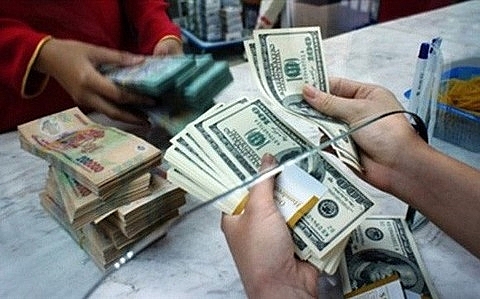Vietnam currency suffers from US-China trade war
 |
| Vietnam should develop a policy to devalue the dong against the dollar at a moderate level to import cheap raw materials to improve the production status in the context of the US-China trade war and the devaluation of the yuan. – Photo cafef.vn |
As the trade war escalates, China has weakened its currency to boost exports, making its goods even cheaper in Vietnam.
Banking expert Nguyen Tri Hieu said while the Chinese yuan had lost 4 per cent against the dollar since the beginning of this year, the dong had devalued by only 1.5 per cent against the dollar. The dong had also appreciated by some 1.8 per cent against the yuan to date this year.
The moves made Chinese imports much cheaper, Hieu said, adding that Vietnam had to balance between controlling the trade deficit and being able to compete with cheaper Chinese goods in the market.
Hieu said the Government should remain cautious as the yuan could fall even further.
According to Hieu, China has set the yuan’s foreign exchange rate at 6.95 per dollar, but around two years ago, that number was even lower at 6.69 per dollar, so there was potential for the yuan to slip further.
At this moment, Hieu said, a further devaluation of the dong was not necessary. However, if the trade war continued, the dong should be devalued by another 1.5 per cent this year to offset the devaluation of the yuan against the dollar.
A further devaluation of the dong would support Vietnam’s exports and prevent Chinese products from flooding Vietnam like in 2015 when the yuan devalued sharply against the dollar, Hieu said.
However, Hieu also said a sharp devaluation of the dong could also cause a rise in Vietnam’s public debts and inflation. He explained that more than half of the nation’s debts were in dollars.
Nguyen Duc Thanh, director of the Vietnam Institute for Economic and Policy Research (VEPR), also said that Vietnam should develop a policy to devalue the dong against the dollar at a moderate level to import cheap raw materials to improve the production status in the context of the US-China trade war and the devaluation of the yuan.
According to Thanh, Vietnam imports raw materials from China to process and export, and the adjustment of the exchange rate will benefit importers from and exporters to the US. Taking advantage of the two big markets can improve production and the trade balance.
The US and China are Vietnam’s two most important trade partners. China is the largest import market with turnover of US$31.1 billion, with key commodities including fabric, phones and accessories and accounting for one fourth of total import turnover. China has replaced South Korea as Vietnam’s biggest trade partner.
In terms of exports, the US is Vietnam’s largest market with export turnover of $21.5 billion in the first half of 2018, increasing 9.2 per cent compared to the same period in 2017 and accounting for one fifth of Vietnam’s total export turnover.
According to Thanh, when the yuan fell sharply and the dollar showed signs of price appreciation, Vietnam’s trade balance was greatly impacted due to cheap Chinese goods flowing into the domestic market.
“The exchange rate will still suffer from pressure in the context of international financial markets showing concerns about the escalation of the US-China trade war. Vietnam should develop a policy to devalue the dong against the dollar at a sensible rate, and lower than the devaluation of the yuan against the dollar to benefit and improve production,” Thanh recommended.
Economist Ngo Tri Long, former director of the Market Price Research Institute under the Ministry of Finance, said that the central bank should adjust the exchange rate based on the market and not the yuan.
Long said adjusting the dong’s value at the moment was a risky move.
It would be hard to achieve the nation’s target of keeping inflation below 4 per cent this year, not to mention other factors such as higher oil prices and natural disasters, Long said.
If Vietnam decided to move forward with devaluing the dong, the adjustments should be based on market demand and not on the yuan’s value, Long said, adding that a 2 per cent drop would better match current market conditions.
What the stars mean:
★ Poor ★ ★ Promising ★★★ Good ★★★★ Very good ★★★★★ Exceptional
Related Contents
Latest News
More News
- Cashless payments hit 28 times GDP in 2025 (February 04, 2026 | 18:09)
- SSIAM and DBJ launch Japan Vietnam Capital Fund (February 04, 2026 | 15:57)
- Banks target stronger profits, credit growth in 2026 (February 04, 2026 | 15:43)
- Vietnam on path to investment-grade rating (February 03, 2026 | 13:07)
- Consumer finance sector posts sharp profit growth (February 03, 2026 | 13:05)
- Insurance market building the next chapter of protection (February 02, 2026 | 11:16)
- NAB Innovation Centre underscores Vietnam’s appeal for tech investment (January 30, 2026 | 11:16)
- Vietnam strengthens public debt management with World Bank and IMF (January 30, 2026 | 11:00)
- Corporate bond market poised for stronger growth cycle (January 28, 2026 | 17:13)
- Vietnam's IPO market on recovery trajectory (January 28, 2026 | 17:04)

 Tag:
Tag:




















 Mobile Version
Mobile Version